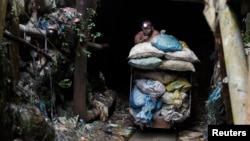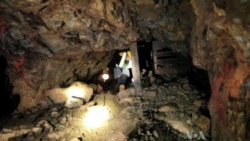PARACALE, PHILIPPINES —
Gold mining has long been a risky business, with prospectors gambling with their lives in search of riches. In the Philippines, the government hopes to reduce the risk and increase profits by banning the most dangerous practices, lowering the number of small operators and replacing them with big, foreign firms.
Illegal mines in the Philippine gold town of Paracale claimed many lives before the government shut them down in 2012. However, despite the ban, some compressor-mining operations are still active, sending divers to dig for ore in unstable tunnels below the riverbed.
The process underwater is similar to the risky techniques illegal operators use on land. Workers carve tunnels without proper support, even digging through stone pillars. As a result, deadly cave-ins are not uncommon.
Chita Magbanua, who used to run an illegal mine in the area, says miners look at it as an adventure.
“Is there a tunnel without danger? But because it’s an adventure, for money, people risk if it is about money,” said Magbanua.
The Philippine government is eager to profit from the country’s gold, but wants to improve safety and raise revenues.
In recent years, authorities have welcomed big mining operators, such as Canadian-owned TVI Resources Development, which extracts copper, zinc, silver and gold in the southern island of Mindanao.
TVI is expected to provide better protection of the environment and workers while still increasing revenue. John Ridsdel, formerly chief operating officer with TVI, said increasing revenue and safety can be a steep challenge in the rural parts of the Philippines.
“When a mining operation goes into pretty anywhere in our country, you are going into an area where the state is absent, there are no roads, there are no doctors, there are no nurses, there are no health clinics, there are no schools, there are no police, there are no judges, there's none of that stuff or very little,” said Ridsdel, outlining the difficulties mine operations face.
He says mining operators end up providing some of these basic services. TVI reports spending some $2 million a year on community outreach and reforestation efforts. Mining companies also paid more than half a billion dollars in taxes to the Philippine government in 2011.
To further boost revenues, the government is planning to raise taxes. Foreign mining firms have responded by cutting back on spending and holding open positions promised to illegal miners.
In Paracale, miners worry that with their risky methods banned, and the foreign companies suspending hiring, they have few options to provide for their families.
Illegal mines in the Philippine gold town of Paracale claimed many lives before the government shut them down in 2012. However, despite the ban, some compressor-mining operations are still active, sending divers to dig for ore in unstable tunnels below the riverbed.
The process underwater is similar to the risky techniques illegal operators use on land. Workers carve tunnels without proper support, even digging through stone pillars. As a result, deadly cave-ins are not uncommon.
Chita Magbanua, who used to run an illegal mine in the area, says miners look at it as an adventure.
“Is there a tunnel without danger? But because it’s an adventure, for money, people risk if it is about money,” said Magbanua.
The Philippine government is eager to profit from the country’s gold, but wants to improve safety and raise revenues.
In recent years, authorities have welcomed big mining operators, such as Canadian-owned TVI Resources Development, which extracts copper, zinc, silver and gold in the southern island of Mindanao.
TVI is expected to provide better protection of the environment and workers while still increasing revenue. John Ridsdel, formerly chief operating officer with TVI, said increasing revenue and safety can be a steep challenge in the rural parts of the Philippines.
“When a mining operation goes into pretty anywhere in our country, you are going into an area where the state is absent, there are no roads, there are no doctors, there are no nurses, there are no health clinics, there are no schools, there are no police, there are no judges, there's none of that stuff or very little,” said Ridsdel, outlining the difficulties mine operations face.
He says mining operators end up providing some of these basic services. TVI reports spending some $2 million a year on community outreach and reforestation efforts. Mining companies also paid more than half a billion dollars in taxes to the Philippine government in 2011.
To further boost revenues, the government is planning to raise taxes. Foreign mining firms have responded by cutting back on spending and holding open positions promised to illegal miners.
In Paracale, miners worry that with their risky methods banned, and the foreign companies suspending hiring, they have few options to provide for their families.










